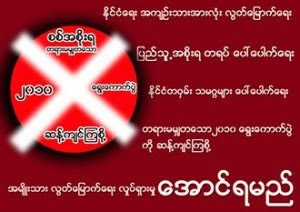Whenever there was a reshuffle within the military regime, it claimed and accused the sacked officials with the corruption issues. Indeed, all of the officials from the military regime have committed thousands of offenses related to corruption. In this essay, I would like to analyze the causes of corruption and its economic, political and social/cultural consequences.
According to the World Bank, corruption can be defined as the abuse of public power for private benefits. Although corruption and bribery exist together in most cases, not all acts of corruption result in the payment of bribes. Tanzi, Director of the Fiscal Affairs Department, International Monetary Fund, once mentioned that the President of the country who has an airport built in his small hometown is also engaging in an act of corruption that does not involve the payment of a bribe (Tanzi, 1998:565). If we take account this definition and measure the abuses of public power by the military regime officials, the figures will be uncountable.
Acts of corruption can be classified as
Bureaucratic or political leadership
Cost-reducing to the briber or benefit enhancing
Briber-initiated or bribee-initiated
Centralized or decentralized
Coercive or collusive and
Involving cash payments or not.
As all these acts lead to the offenses, it is important to identify the causes of the corruption that encouraged the officials to abuse the public power. Mauro, an economist in International Monetary Fund’s Policy Department and Review Department, traced the causes of corruption and classified into six main issues as
1. Trade restrictions
2. Price Controls
3. Multiple exchange rate practices and foreign exchange allocation scheme
4. low wages in the Civil Service
5. Natural resources endowments and
6. Sociological factors.
Undoubtedly, these issues were also the main causes of the corruption in Burma as well. I would like to use some examples of events to support this claim.
Trade restrictions:
If importing a certain good is subjected to quantitative restriction, the required import licenses become valuable so that importers of this good will consider bribing the officials who control their issue. For example, ‘car permit’ cases in Burma.
Price Controls:
Price controls can create incentives for individuals or groups to bribe officials. For example, ‘cellular and GSM Phones’ prices produced by the Minister of Telecommunications, Post & Telegraph were below the market prices so that people consider to bribe the officials to get with below-market rates
Multiple exchange rate practices and foreign exchange allocation schemes:
If there are several exchange rates, for example, one for importers, one for tourists and one for investors, differentials among these rates can lead to attempts to obtain the most advantageous rate. In Burma, there exist a lot of exchange rates in FE market, Foreign Exchange Certificate rate, the US Dollars rate, and Black Market rate and so on.
Low wages in the Civil Service:
When Civil Service pay is too low, civil servants may be obliged to use their positions to collect bribes. In Burma, the uneducated military officials know only how to print money and how to announce the double, triple salary increases. However, the purchasing powers of these figures remain the same or sometimes even lower. This is the widespread and well-known corruption issue in all ministries of Burma.
Natural Resources Endowments (oil, gold, etc.):
Corrupt officials can turn a blind eye with this issue. Burmese military regime is the only government in the world to put its own people with the risks of acute fuel shortages to export the natural resources for its private interests.
Sociological factors:
Public officials are more likely to do favors for their relatives in some societies. In Burma, most of the businesses and high level jobs in the Civil Service are related to the families of the military officials.
All the above factors represent the causes of corruption and it has a lot of consequences in economic, political and social/ cultural terms.
In economic terms, many economists agree that high levels of corruption results a range of negative consequences including _
Creating inefficiencies in the operation of markets.
Distorting the composition of public expenditure by focusing spending on activities likely to yield large bribes, for example, major public construction works and defense contracts. (i.e. The military officials often say how many highways and bridges have constructed)
Reducing the level of direct foreign investment by adding costs and creating uncertainty.
Distorting the composition of public expenditure by focusing spending on activities likely to yield large bribes, for example, major public construction works and defense contracts. (i.e. The military officials often say how many highways and bridges have constructed)
Reducing the level of direct foreign investment by adding costs and creating uncertainty.
In political terms, the corruption has the negative consequences, including _
It substitutes personal gain for ideology and principle.
It prevents or makes it more difficult for governments to implement laws and policies.
It erodes international confidence in the government.
It encourages cynicism and discourages political participation.
It can contribute to political instability, provoke coups d'état and lead to civil wars.
It delays and distorts political development and sustains political activity based on patronage, clientelism and money.
It reduces the transparency of political decision-making.
In social/cultural terms, the consequences can be noted as _
It disempowers people and encourages their sense of alienation.
It discourages participation in civil society and elevates self-interest as a guide to conduct.
As education spending falls, so will levels of literacy.
As health spending falls, so the incidence of disease will increase.
The poor will be increasingly marginalized and their sense of social exclusion will be strengthened. (U4 Resource Centre, Chr. Michelsen Institute, Norway)
Moreover, development economists and social researchers mentioned the lives of the people under the corrupted government as _
If they want access to utilities - electricity and water - they may find that supplies are only forthcoming if a bribe is paid to the appropriate officials.
They may also experience disruption of supply due to defects in the construction of the pipeline: the contract for which was given not to the best qualified contractor but to the one who paid the best bribe.
If they want their children to go on to school, they may find that the head teacher insists on a special personal payment.
If they fall ill, they find that primary health care is inadequate because budget funds have been re-directed to buying defense equipment. These purchases are almost invariably surrounded by 'commission payments' and bribes.
If they actually see a nurse or doctor, the medical staff may demand extra payment and if they need drugs, they often discover that there is a shortage because of 'leakage' to the black market.
When seeking public sector employment, they may discover that jobs are bought and sold like other commodities.
Once in employment, transfers and promotions may also be subject to the payment of bribes to superior officials.
If they want to start a small business - a market stall or taxi service - they often find that the required permits and licenses are only available after a bribe has been paid.
They may also experience disruption of supply due to defects in the construction of the pipeline: the contract for which was given not to the best qualified contractor but to the one who paid the best bribe.
If they want their children to go on to school, they may find that the head teacher insists on a special personal payment.
If they fall ill, they find that primary health care is inadequate because budget funds have been re-directed to buying defense equipment. These purchases are almost invariably surrounded by 'commission payments' and bribes.
If they actually see a nurse or doctor, the medical staff may demand extra payment and if they need drugs, they often discover that there is a shortage because of 'leakage' to the black market.
When seeking public sector employment, they may discover that jobs are bought and sold like other commodities.
Once in employment, transfers and promotions may also be subject to the payment of bribes to superior officials.
If they want to start a small business - a market stall or taxi service - they often find that the required permits and licenses are only available after a bribe has been paid.
In conclusion, all the causes, costs and impact of the corruption reflect the current situations in Burma and it’s time for the people to kick out the corrupted military regime to create the effective economic and social welfare system.
Khin Ma Ma Myo
(23/04/2006)
Khin Ma Ma Myo
(23/04/2006)
References
Gartner, M. (2003) Macroeconomics, FT Prentice Hall, Pearson Education, Edinburgh
Mauro, P. (1997) Economics issues 6: Why worry About Corruption? , International Monetary Fund, Washington DC
Expert Answers Section, U4-Utstein Anti-Corruption Resources centre, CMI Institute, Norway
Tanzi, V. (1998) Corruption around the World: Causes, Consequences, Scope and Cures, IMF Staff papers, Vol.45, no.4, Washington DC


































